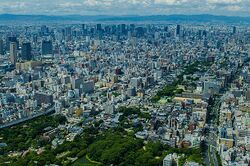Nosamo: Difference between revisions
Guadalupador (talk | contribs) (added etymology and history sections) |
m (1 revision imported) |
Latest revision as of 03:44, 5 April 2019
Nosamo | |
|---|---|
Capital of Guadalupador | |
 Nosamo Skyline Facing toward Chedene District | |
| Etymology: East River Bank (Archaic Dorian-Itaric) | |
| Nickname(s): Guadalupador's Birthplace, Yama's Throne | |
| Location of Nosamo | |
| Country | Guadalupador |
| Province | Nosamo Province |
| Founded | c. 3100 BCE |
| Government | |
| • Mayor | Getuno Larisu (Federation Party) |
| Population (November 2018) | |
| • Total | 10,790,678 |
| Demonym | Nosamoan |
| Time zone | NSDT |
Nosamo is the capital and largest city in the Federal Union of Guadalupador. Nosamo is considered to be the oldest continuously inhabited urban area on the continent of Supaciviga and ranks as one of the oldest cities on Earth. Nosamo has been the capital of several precursor states within Guadalupador. It became the formal capital of Guadalupador relatively recently in 2013 after a constitutional convention changed the capital of Guadalupador from the northern city of Olahn to Nosamo. Nosamo was also the capital of the Integralist Confederation of New Yama from 2026 to the state's collapse in 2045. From 2045, Nosamo resumed as capital of Guadalupador. Nosamo is considered the cultural capital of Guadalupador.
Etymology
According to archaeologists the earliest surviving records of Nosamo go back to circa 2850 BCE refer to the settlement of Nosamo as East River Bank based on its name in Pre-Itari Dorian hieroglyphics. The name refers to the initial collection of settlements on the east bank of the Guadala River.
History
Foundation
Nosamo was settled circa 3000 BCE after several groups of seasonal nomadic pastoralists arrived from northern Guadalupador possibly to stay only temporarily to ride out the winters before the area was permanently settled year-round a century later following a transition to horticulture. The banks of the Guadala River provided the ancient Nosamoans with fertile soil and predictable flood times. The Nosamoans developed irrigation techniques based on flood control digging irrigation canals throughout the flood plains.